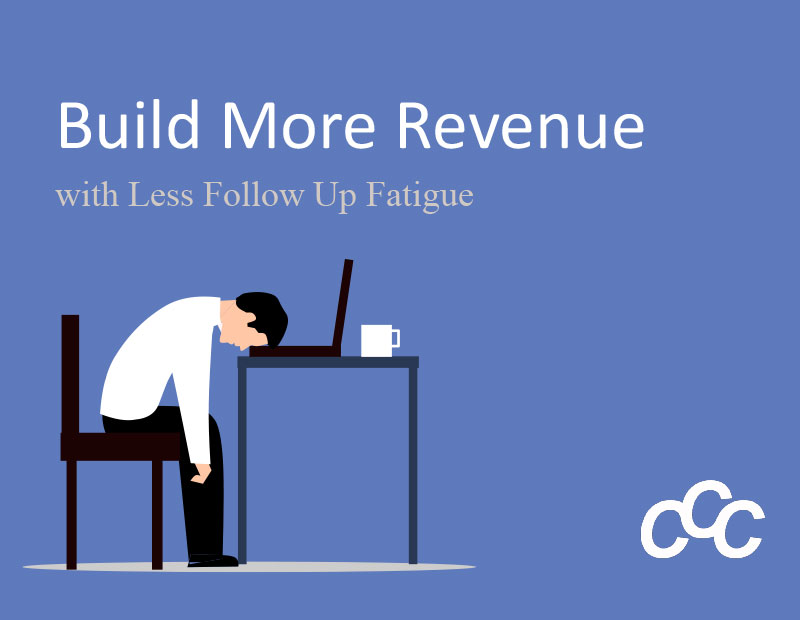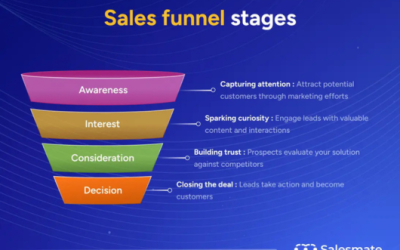Imagine if 50% of your new business came from current clients either directly or by referral? Wouldn’t that be great? More client time, less networking and much less Follow Up Fatigue (FUF). While the frequency of “repeat business” is different by industry, generating new revenue from current clients is the place to start, provided you have value to offer.
When you add value, your clients include you as part of the team and not just as an order taker. Value takes many forms and touching your clients throughout the year is key to building an enduring relationship. Sometimes it’s listening to client needs and other times, it’s showing empathy. In either case, you won’t have the chance if you are not present on a regular basis.
Many businesses that take orders, become a commodity and lose business to a lower bidder. When that happens, you know there was no relationship.
When a business loses sight of its clients’ needs and doesn’t touch its clients throughout the year, due to the pressure to meet “quotas,” clients leave and the business falls victim to Follow Up Fatigue. Salespeople are told to bring in more clients and time is spent with many unqualified leads being stuffed into the company’s sales funnel.
When a business puts “relationship” as the foundation of their CRM, they will feel productive, feel like they are truly helping customers, and will be able to meet business goals without experiencing Follow Up Fatigue.
There are few things that a business can do to help achieve this.
Configure your CRM to customer-centric business goals.
Your business goals should always be customer-centric. If your business goals are internally focused, then it is hard to build a relationship with your customer. You need to be able to answer questions such as:
- What are my customers’ needs?
- How does my product or service solve their problems?
- How can we make their life better?
By answering these questions, you are taking the focus off of yourself and focusing on the customer. When you focus on the customer, your business goals will reflect that. A CRM that is configured to customer-centric business goals will help you stay on track and build a relationship with your customer.
Implement automation that focuses on relationships.
You know that you cannot do it all like answering every email, remembering every customer’s birthday, and sending out product suggestions. You can use your CRM’s automation capabilities to send reminders, birthday wishes, and new product or service introductions, and so on. The key to automation is personalizing it. Whether it is adding a greeting that includes the customer’s first name or a friendly, conversational tone of the content, automation should be relational. Auditing your automated content from time to time is a good practice. You want to make sure your greeting, the tone of your content, and your message continue to resonate with your customers.
Build a referral program
Referral programs can be seen as matchmaking programs and can be inbound and outbound. Find referrals for your clients and you will build significant client loyalty. Very soon, they will be referring to you. Your customer has a relationship and therefore can refer (match) someone to you. Customers do not refer someone to a business if they do not have a bond with the business first. Building a customer-centric referral program through your CRM will help your customer know which of their friends and family would be a good fit as your customer. You can do this by providing great customer service, helping your customer be knowledgeable of your offerings, and offering incentives that will nurture your relationship with them.
Conclusion
Customer relationships take work, but healthy customer relationships reduce Follow Up Fatigue because you are building valuable customer relationships rather than chasing numbers. Integrating strategies such as customer-centric business goals, automation, and referral programs through your CRM will help you build lasting customer relationships. If you would like to talk about implementing a CRM strategy that is customer-centric, please contact us at 301-332-0613 or fill out the form.
[formidabl id=2][/vc_column_text][/vc_column][/vc_row][vc_row][vc_column][vc_custom_heading text=”More CRM Topics” font_container=”tag:h2|text_align:center” use_theme_fonts=”yes”][vc_empty_space][vc_basic_grid post_type=”post” max_items=”2″ element_width=”6″ orderby=”rand” grid_id=”vc_gid:1617801686966-10295b11-759c-7″ taxonomies=”25, 24″][/vc_column][/vc_row]





